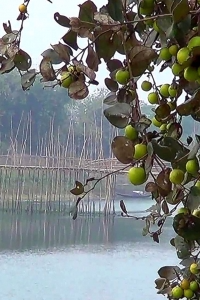
“Mom, are you sure you want to do this?” asked Arman. “You could have had locations thousand times better than this.”
Afsar, his older brother, gave Arman that same old look when he says something unwelcoming, with his lips curled in disdain.
“It’s alright! I take it back. She is the director; the epitome of creativity.” Arman said again, only to turn the disdain into fury.
Their mother Sabiha was totally unaware of what was going on around her. As if she is musing on something beyond this world and the mere squabble among her boys will never be able to penetrate it. She was still sitting inside the car, staring at the main entrance. It was that same void space flanked by yellow walls ending in a square shaped pillar. The pillar on which, if climbed and then toppled, you may get a scar on your chin. Of course, that scar will remain forever.
“Just look at the entrance!” Arman said again. “Can’t they even put a gate? And mom thinks this will be perfect place for her shooting!” He couldn’t realize why this time her mother came in person to choose a location rather than sending her assistants. Moreover, why there was a need to make a Bengali film here when she has already crafted a niche in England? Everyone knew Sabiha Masud, a well-acclaimed British filmmaker.
“Nobody has asked for your expert opinion. So, keep your mouth shut,” said Afsar, the calm and quiet one among the brothers.
“As you wish big bro,” Arman said and remained quiet.
The boys, although born and brought up in the west, inherited some of the traits of Asian values along with intellect and cognitive skill from both parents. Also, like his mother the younger one showed interest and capability in the creative field of filmmaking but more on the technical side. He already had a good grip on cinematography at an early age. What he needed was the in-depth understanding of subject like his mother, which definitely comes with age and experience. May be that was the reason he failed to believe that the place will do justice to his mother’s script.
Afsar, his elder brother opened the door of the car. Sabiha was still sitting inside.
“Mom,” said Afsar; “Aren’t you coming to check yourself?”
Sabiha came out of her trance and nodded. Then she slowly got off the car. Afsar looked at her and sensed something. Something he couldn’t define as pain or sorrow but more than that, reflected in his mother’s eyes. What was it? He couldn’t fathom the mystery. Sabiha looked at the bare path, which seemed to have been a gravel path sometimes; now it looked like a bare middle parting of a Hindu widow’s hair that was broadened with age and sorrow. She took her steps in a cautious manner on the path as if she didn’t want to hurt it. Arman passed her in a rush and started clicking photos randomly. Afsar came forward and held her hand which was a bit unusual. Sabiha looked at him but said nothing. She gently put her other hand in her trousers’ pocket. They all started walking towards the front door.
Sabiha felt the soft breeze caressing her face, as if it was someone’s soft hand filled with love and affection asking her, ‘what took you so long?’ She closed her eyes for a while but couldn’t keep it close for long as she heard hurried footsteps towards her.
“Hello madam!” said a middle aged bald guy while rubbing his hands and tilting his head to the left side. “Welcome to Hossain Villa,” said the guy. Afsar felt a little movement of his mother’s fingers on the hand he was holding. But Sabiha said nothing and just nodded to the bald guy. “Myself Delowar Hossain, owner of Hossain Villa,” the guy smiled with his yellowish teeth and stretched his hand, which was a gesture, well-practiced since the day before to fit in the ‘western culture’ he imagined. But Sabiha felt like someone has whipped her when she heard the word ‘owner’.
“Assalamualaikum,” Sabiha said with a dry smile raising her right hand towards her forehead.
“Walaikum salam,” Delowar drew back his hand with a fading smile but again brought it back. “I bet you’ll like my house, madam. It’s like a palace. You won’t get this type of location anywhere for your film,” he said. “Now-a-days, old places like this are all demolished and turned into new apartment buildings. But I have kept it as I got it from my forefathers,” he said.
“Forefathers!” Sabiha had a repulsive feeling hearing the word but was still quiet.
“I’ll show you around, madam.” Delowar was pretty enthusiastic. “Come this side. On your left, this is the…”
“Boithok khana,” said Sabiha looking at the enormous room with big windows. The gothic structure with huge pillars remained the same.
“How did you know!” Delowar was amazed.
“The living room or drawing room or hall, whatever you call it today, was called boithok khana those days,” Sabiha said indifferently.
“Mom always does her research well before she starts a new film,” said Arman in an accented Bengali.
“Very well, very well,” Delowar smiled again tilting his head appreciating both Arman’s Bengali and his mother’s research skill. “That’s why her films are so good, so famous,” he went on saying. “I really love to watch your films madam,” he added. Before Sabiha could ask which films he had watched, someone giggled at her back. Sabiha looked back and found two girls, one in her teens and the other a bit younger. The girls didn’t wear simple salwar kurta with their hair parted and braided like Sabiha in her childhood, but were clad in denim and top with exactly the same eyes like her; deep and thoughtful.
“They are my daughter madam,” said Delowar. “Manisha and Prottyasha.”
The girls said salam to Sabiha.
“Very nice name,” said Sabiha affectionately. She felt like hugging them or at least caress their faces but resisted herself. The younger one Prottyasha still had the remnants of giggle on her lips.
“Now what?” asked Delowar impatiently.
“Nothing,” said the younger one. “Apa finds it funny as you said you have seen all of her movies,” she directed her eyes to her older sister. Her elder sister widened her eyes and was about to smack her. Both Arman and Afsar laughed and even Sabiha couldn’t help smiling. Delowar also smiled in an awkward manner to hide his embarrassment. He has never seen a single movie by Sabiha. To be precise, he has never watched any contemporary English movies, with most of his English movie knowledge limited to ‘Tarzan- The Ape Man’. In fact, when the agent asked him if he is willing to rent out his house for shooting a film by Sabiha Masud, a prominent British film maker of Asian origin, he asked his daughters if they knew anything about her. It was Manisha and Prottyahsa who were excited to know about the possibility of Sabiha’s arraival in their home.
“Come madam, I’ll show you inside and there’s a big orchard.” Delowar tried to shoo away his daughters but they were stuck to the ground.
“Come on, both of you can show me around,” said Sabiha. The girls’ eyes brightened up. Sabiha started walking and also chatting with Manisha and Prottyasha. She asked about their school, studies, liking and disliking. To her surprise, both of them had something or the other common with her. Especially their interest in literature and cultural activities.
“So you have really watched my films!” said Sabiha with an appreciation.
“Oh, yes, of course,” said Prottyasha. “We watched few of them in the internet and the rest in DVD.”
“Which one did you like most?’
“More or less all of them but ‘The Nest’ was best among all. I think your signature style is the quest for root or sense of belonging to be precise,” said Manisha. “It’s evident in most of your movies. Is it because you miss your home country?”
Sabiha was totally amazed. Manisha’s intellect and maturity was beyond the level that she expected from a girl growing up in a small town. It’s true that she must have read her interviews or some movie reviews but even after that Sabiha didn’t expect her to nurture such clear notion.
“Apa, why don’t you ask her which part of South Asia she is from? You said she never mentioned it in any interview,” Prottyasha whispered to Manisha with great eagerness, but it was clearly heard by all.
Sabiha was listening to everything while looking at a different direction. While trying to be unaffected, she actually had a chill down her spine. She had always evaded the question be it in a formal interview or in a social gathering. When pressurized she had only said she is from South Asia. Of course, it was a bit weird for her and a cakewalk for journalists to find out. However, they were kind enough to spare her either thinking her to be the local eccentric or finding the issue less spicy to cook up a story. They were happy to discuss the films and their content.
‘Are they going to ask me directly,’ Sabiha thought. It would be hard for her to tell a lie to Manisha and Prottyasha. But it was her decision to come here. She dared to confront something she always thought to be filthy and repulsive. As if it was a wound oozing out pus; which she had to clean and do dressing but couldn’t touch it or even look at it. But now she can’t step back. Now she had nothing to lose. In fact, she has lost everything long back. At times, she felt she was born to lose. Whatever she treasured was bound to be lost. A little dolly that would be torn apart by her cousin, favorite glass bangles that would break, and even a letter sent from an unknown admirer would be confiscated. The list always grew longer and one day it included her mother when she was only fourteen.
But nothing could be worse than losing her existence. She felt she lost her existence when her father uprooted them. She still remembered that day, that moment. Her father embraced her and just said softly to pack her stuff. She remembered she came to this orchard to bid farewell to the trees and lessen her plight. Meena, her younger cousin who happened to be her pet, shadowed her. Meena forgot to wipe her own tears streaming down her cheeks but kept on wiping Sabiha’s tears. “Meera bubu, please don’t cry. I know boro chacha is just kidding. He won’t leave the house.” Meena was confident about her uncle, Meera’s father.
Yes, Sabiha was Meera that time. As a typical Bengali kid, she had a formal name along with a nickname. However, if she was a person with dual name, dual identity, then one of it was mostly unused. Nobody knew Sabiha apart from the school records. She was mostly Meera; the bubbly girl frolicking in this orchard. But that day, she lost her existence as Meera too. She was big enough to comprehend forgery or cheating, to realize importance of deeds, documents and court orders, to identify evil against good, and above all to accept the reality. She figured out how dejected her father was. The man was pulverized in despond being cheated by his own brother; being ripped off his existence. All he could say to Meera was these words, ‘we have to leave.’ She knew that severe wound in his soul led her father to a quagmire of despondency to such an extent that he never looked back. He never contacted anyone. He started afresh discarding everything including his surname into profound oblivion. He never said anything to Sabiha but she could read that urge in his eyes and decided to do the same. To dispose the family name ‘Hossain’ or nickname Meera was just another easy addition to her list of losses. Accepting her husband’s surname ‘Masud’ was easier. Nevertheless, her trauma, her quest for root or sense of belonging had always resurfaced in other forms. Sometimes, in the form of her films.
“Keep quiet you moron! If her son is speaking Bengali then obviously, she’s a Bengali,” said Manisha in a hushed voice but it was enough to get Sabiha out of her musing. “She must be from this country and that’s why ended up here for shooting,” said Manisha. Then she turned to Sabiha and asked “Ma’am, what’s the new film about that you’re going to shoot here?”
Sabiha gathered herself and smiled. At least they got the common sense to realize that she’s originally a local without asking her directly. She was relieved that the girls could not guess anything more. And as there wasn’t any more interrogation, she knew she ducked the question this time too. Instead, she said, “You can call me aunty.” The girls’ faces brightened up with this. As if they received some favor- unexpected and unimaginable; like winning a dinner with favourite celebrity in a five-star hotel. The younger one leapt and grabbed Sabiha’s hand in excitement.
“Aunty, come I’ll show you around. No need to wait for father or Apa.” Prottyasha pushed away Manisha and began to drag Sabiha’s hand. Manisha tried to protest but Sabiha smiled and began to walk with her. It seemed to her Prottyasha had a good narration skill but needed to work on her pauses though it was evident she had a soprano voice that got more of a boost with excitement. Sabiha rebuked herself for thinking professional stuff.
Prottyasha almost ran through the orchard showing Sabiha and her boys everything and ended up beside the pond. To her surprise, Sabiha found the pond and its’ surrounding almost same as it was when she left. The red cemented stairs leading to the water was still intact although lost its’ colour. Water in the pond still seemed dark green from top and clear when you hold it in palm. The water hyacinths floated on the same side of the pond with a hue of purple and a little tint of yellow in the middle of each floret.
“Wow, that’s a beauty of course,” said Arman focusing his camera to those water hyacinths.
“Maybe now you’ll think it was a good idea to choose this place for shooting,” Sabiha smiled at Arman.
They all sat beside the pool. The girls and Sabiha’s boys were having a little chit chat as the initial icebreaking was already done. Sabiha looked around for something.
“Are you looking for something?” she asked Sabiha.
“What happened to the Boroi tree over there?”
“There’s no Boroi tree; I mean there never was,” Manisha sounded confident.
“The tree over there…” Sabiha stopped on the midway thinking her query could be boomeranged on her.
“No aunty, there wasn’t any Boroi tree ever on that place. I know this place since my birth,” smiled Manisha.
‘I knew this place even before you were born! And we used to collect sweet and sour Boroi that fell on the ground from that tree,’ thought Sabiha. But she said nothing. Somehow she felt vulnerable. As if she entered a perilous place full prepared but gradually lost her armour. She remained quiet and looked at the pond.
“There was a Boroi tree over there Manisha,” said someone from the back. Sabiha turned and saw another lady standing with a tray filled with snacks.
“Maa, come I’ll introduce you to ma’am,” said Manisha.
“It’s aunty not ma’am,” Prottyasha poked her elder sister. Then she ran to her mother and whispered, “She’s so nice Maa! Such a big celebrity but totally down to earth.”
Manisha went up and took the tray from her mother asking, “I never knew there was a Boroi tree. But how come aunty knew about it?” Her mother said nothing. Sabiha said nothing too. Silence prevailed before Arshad sensed something awkward and said, “It’s a premonition by mom, you see. Many a time it happens that whatever she feels becomes to be true.” Manisha smiled and offered tea and snacks to all. Sabiha’s boys found the traditional snacks quite interesting and tried them eagerly. Their topic of discussion was redirected to food.
Sabiha walked to the place where the Boroi tree used to be. Manisha’s mother followed her. They both remained quiet being unable to break the barrier created by upsurge of mixed emotions. Sabiha sat on the ground gazed at the place in the ground the tree’s trunk used to be. During their childhood, Sabiha broke her arm once while saving Manisha’s mother from falling off the tree. Now There wasn’t any sign of its existence. It was completely uprooted. Green grass has covered everything erasing all the signs of the poor Boroi tree except from those left in few people’s memories.
Manisha’s mother stared at Sabiha. She still had the scar on her chin she got from falling off the pillar at entrance. She wanted to run and put her arms around Sabiha’s neck like those days. She craved for those sweet and sour Boroi, the fruit that both of them used to pluck from the tree and savour them sitting on the ground. She wanted to update her all that happened in life after she left. But she was hamstrung by the wrongdoing of her father. She felt her father has created a legacy of usurpation and passed it on to an outsider, her husband. He gobbled everything, the house, the orchard, and even the family name Hossain. Now it was payback time. She cannot take her heart out to Sabiha even if she wants to. Nevertheless, Manisha’s mom approached a little towards Sabiha and after a little struggle uttered the words, “How are you, Meera bubu?”
“Arshad, Arman! We need to go,” Sabiha sprang to her feet all of a sudden.
Both the boys were astonished. They have never seen their mom behaving like this. Sabiha began to walk towards them. She didn’t look back. She didn’t dare. If she did she could have seen Manisha, Prottyasha’s mother or rather her cousin Meena having the same tears streaming down her cheeks. The only difference was, today Meena was wiping her own stream of tears.
About the Author






Comments